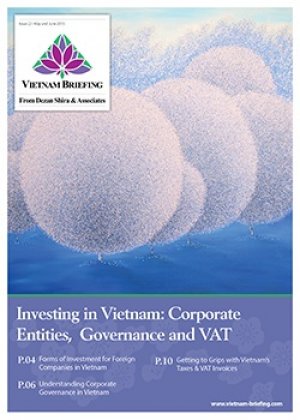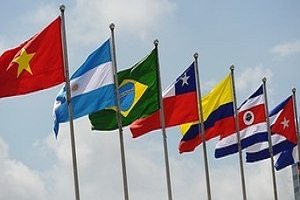Vietnam – Latin America Trade: Complementary Economies under the TPP
By: Oscar Mussons, Fernando Vidaurri
With the text of the Trans-Pacific Partnership (TPP) trade agreement agreed to in recent months an influx of investment into Vietnam is expected. Abundant low-cost manufacturing, a young labor force and a growing middle class have made Vietnam a very attractive investment destination. The TPP will further boost trade, not only with established partners such as the US and Japan, but also with Latin America.
According to the Ministry of Industry and Trade, bilateral trade between Vietnam and Latin America increased from only tens of millions USD in 1990 to US $9.5 billion in 2014. Out of these US $4.71 billion of Vietnam consisted of exports to Latin America and US $4.8 billion in imports to Vietnam from the region. The TPP will further increase Vietnam’s trade with the region, especially with Chile, Mexico, and Peru – all of which are party to the agreement. In this article, we will take a look at trade relations between Vietnam and its Latin American partners and future business opportunities.
Chile – Current Strengths and New Business Opportunities
Out of the three Latin-American countries party to the agreement; Vietnam has a free trade agreement (FTA) in place only with Chile. In fact, despite the FTA going into effect only in 2014, good exchanges between Chile and Vietnam have been growing at an average of 26.8 percent over the past five years. During the first eleven months of 2015 total exports from Chile to Vietnam reached US $244.7 million, while imports from Vietnam to Chile reached US $515.5 million in the same time period.
 RELATED: International Tax Planning Services from Dezan Shira & Associates
RELATED: International Tax Planning Services from Dezan Shira & Associates
The timber and woodwork industry provides one opportunity for cooperation between Chilean and Vietnamese companies. Chile is an important timber producer with an annual production of 40 million cubic meters, while Vietnam’s wooden products exports have grown at an annual rate of 15 to 18 percent in the last decade. Vietnam is currently the largest wooden products producer in Southeast Asia and sixth largest in the world, with production reaching US $7 billion in 2015. Since Vietnam is dependent on timber imports for its wooden exports, this provides multiple opportunities for Chilean companies.
In addition to its fast growing economy, Vietnam has a growing middle class with rising purchasing power. This has helped make the wine market one of the most promising industries for Chilean companies. Chile currently has the second largest market share at 20 percent. Chilean wine has become increasingly popular since it is perceived as quality wine with a good price. Additionally, Chilean wine has benefited from the lowering in customs tariffs from 56 percent to 20 percent under the FTA.
Finally, mining is one of the strongest export markets for Chile, due to its well-developed infrastructure and abundant natural resources. However, the sector has been highly dependent on shipments to China and has been affected by that country’s economic slowdown. Stronger economic ties and the reduction of trade barriers under TTP with Vietnam thus offers multiple opportunities for Chilean companies to diversify their export markets.
Mexico – Potential for Stronger Economic Ties and Cooperation
Despite not having a FTA agreement in place, Mexico is currently Vietnam’s second largest trading partner in Latin America behind Brazil. Bilateral trade between the two countries was worth nearly US $1.7 billion up to the first eleven months of 2015, an increase of 57percent year-on-year. According to data from the Vietnamese Trade office in Mexico total bilateral trade was expected to reach US $1.98 billion at the end of 2015, a 52.3 percent increase from 2014.
The TPP will further deepen these ties and allow companies to take advantage of opportunities found within each market. Currently, major imports from Mexico to Vietnam include computers, electronic products, machinery and equipment, scrap iron and steel, and food for cattle. It is forecast that imports will rise due to sharply rising demand for goods and materials from Mexico. Many of these industries can greatly benefit from Vietnam’s growing industrial capacity and fast expanding economy. Vietnam has a larger and cheaper workforce than fellow TPP signatory Malaysia, and thus it provides a good starting point for companies looking to invest in Asia.
 RELATED: Vietnam’s Trade Future Looks Bright with US and Chile as Prime Markets
RELATED: Vietnam’s Trade Future Looks Bright with US and Chile as Prime Markets
Additionally, Mexican companies looking to enter the Vietnamese market can greatly benefit from the support of trade promotion agencies, such as ProMexico. In fact, this past November a business delegation visited Vietnam in order to study investment and cooperation business opportunities. A second delegation, also organized by ProMexico will visit the country in February, the support of these agencies will be key for companies looking to invest in Vietnam.
Peru – Beginning of a New Economic Relationship
While bilateral trade between Vietnam and Peru is not as strong as that between Vietnam and other Latin American countries, both countries have been working together to strengthen economic and political ties even before the TPP was signed, a fact highlighted by the recent opening of a Peruvian embassy in Hanoi.
In an effort to reinforce trade links, the Vietnamese Ministry of Industry and Trade and the Peruvian Ministry of Foreign Relations signed an agreement for cooperation economic, trade and technological issues on August 31, 2015. The agreement would also establish a framework that would allow cooperation in other areas such as agriculture. Under this agreement, Peru is looking into agreements that would allow it to export citrus, blueberries and avocados to the growing Vietnamese market.
Export in the fishing and mining can greatly benefit under the TPP. After the TPP comes into effect, Vietnam will remove 66 percent of its tariffs on exports of salmon, mackerel, tuna, codfish, anchovies and fish oil. This will benefit as much as 98 percent of the Peru’s export value, thus proving attractive for companies in this industry. Meanwhile, in the extraction industry where Peru is global leader in copper mining, companies can look to invest more in the Vietnam market, the fastest growing economy in ASEAN, at a moment when commodity exports to other markets are slowing down.
Moving Forward
The TPP and FTAs between Vietnam and Latin America show great potential for both regions moving forward, however, certain challenges remain. These include language barriers, geographical distance and limited information between partners. However, some of these challenges can be overcome when companies are provided with the right guidance. This will require a better understanding of investment procedures, further market research and guidance through the Vietnamese legal framework.
With decades of experience operating in the region, the specialists at Dezan Shira & Associates are well placed to help Latin American businesses overcome these challenges, and succeed in the Vietnamese market, and can offer support directly through our Spanish Desk. For more information, please get in touch further at vietnam@dezshira.com.
|
Asia Briefing Ltd. is a subsidiary of Dezan Shira & Associates. Dezan Shira is a specialist foreign direct investment practice, providing corporate establishment, business advisory, tax advisory and compliance, accounting, payroll, due diligence and financial review services to multinationals investing in China, Hong Kong, India, Vietnam, Singapore and the rest of ASEAN. For further information, please email vietnam@dezshira.com or visit www.dezshira.com. Stay up to date with the latest business and investment trends in Asia by subscribing to our complimentary update service featuring news, commentary and regulatory insight. |
 Investing in Vietnam: Corporate Entities, Governance and VAT
Investing in Vietnam: Corporate Entities, Governance and VAT
In this issue of Vietnam Briefing Magazine, we provide readers with an understanding of the impact of Vietnam’s new Laws on Enterprises and Investment. We begin by discussing the various forms of corporate entities which foreign investors may establish in Vietnam. We then explain the corporate governance framework under the new Law on Enterprises, before showing you how Vietnam’s VAT invoice system works in practice.
 Navigating the Vietnam Supply Chain
Navigating the Vietnam Supply Chain
In this edition of Vietnam Briefing, we discuss the advantages of the Vietnamese market over its regional competition and highlight where and how to implement successful investment projects. We examine tariff reduction schedules within the ACFTA and TPP, highlight considerations with regard to rules of origin, and outline the benefits of investing in Vietnam’s growing economic zones. Finally, we provide expert insight into the issues surrounding the creation of 100 percent Foreign Owned Enterprise in Vietnam.
 Tax, Accounting, and Audit in Vietnam 2014-2015
Tax, Accounting, and Audit in Vietnam 2014-2015
The first edition of Tax, Accounting, and Audit in Vietnam, published in 2014, offers a comprehensive overview of the major taxes foreign investors are likely to encounter when establishing or operating a business in Vietnam, as well as other tax-relevant obligations. This concise, detailed, yet pragmatic guide is ideal for CFOs, compliance officers and heads of accounting who need to be able to navigate the complex tax and accounting landscape in Vietnam.
- Previous Article Vietnam Market Watch: Auto Sales, Uber’s Success in Vietnam, and Vietnam’s Economic Growth
- Next Article Easy Riding – Investment Opportunities in Vietnam’s Motorcycle Industry










